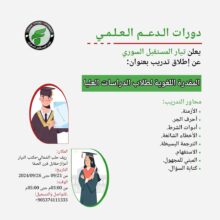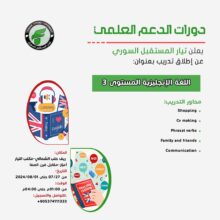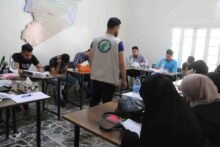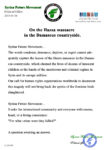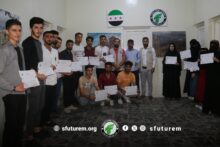Concerns about minorities in Syria: Between reality and illusion

Introduction:
Minorities in Syria face significant challenges after the fall of Bashar al-Assad’s regime, amid pivotal political and security changes. There are also concerns about security instability in some areas, making it difficult for many to return to normal life. International efforts to achieve stability in Syria continue, but the road remains long and complex.
Effective Efforts:
The Syrian reality appears complex, as the majority identity of Syrian society has borne the consequences of the past years. Many fear the alarming repercussions on minorities, viewing them as weak forces in the midst of a fierce power struggle. As a result, several associations and organizations have emerged to protect the rights of minorities in Syria and support them. Among these organizations are:
- The Syrian Observatory for Human Rights, which works to document human rights violations in Syria, including those affecting minorities.
- The Violations Documentation Center in Syria, which focuses on documenting violations against all groups, including ethnic and religious minorities.
- Syrians for Truth and Justice, which works to promote human rights and justice in Syria with a focus on minority issues.
- The Annual Forum for Minority and Indigenous Peoples’ Issues in Northern Syria, a platform for discussing minority and indigenous peoples’ issues in northern Syria. Its goal is to foster understanding and cooperation among different groups. All of these efforts aim to provide legal and humanitarian support to minorities, enhance their rights, and protect them amid the current challenges.
About Minorities in Syria:
Syria is home to a diverse group of ethnic and religious minorities that form an important part of its social fabric. Among these minorities are:
- The Kurds, who make up the largest ethnic minority in Syria, are mainly concentrated in the north and northeast of Syria, but are spread throughout the entire Syrian map, especially in Damascus.
- The Alawites, a religious sect that forms part of Syrian society, particularly in coastal areas such as Latakia and Tartus.
- Christians, with their various sects such as Syriacs, Armenians, Assyrians, and Chaldeans, who are present in different parts of Syria.
- The Druze, who mainly live in the Jabal al-Druze region in southern Syria and some villages in Idlib governorate.
- The Turkmen, an ethnic minority found in various regions of Syria, particularly in the north.
- The Armenians, who live in Aleppo, Damascus, and some other cities.
- The Yazidis, a religious minority living in northeastern Syria.
- The Circassians, an ethnic minority residing in different regions of Syria.
- The Ismailis, a sect of the Shia Islam community that descends from the Seveners, with their presence in Syria dating back to the medieval era. They are mainly concentrated in Hama governorate and surrounding areas such as Salamiyah and Madiya.
These minorities face multiple challenges, especially in light of the political and security changes in Syria after the fall of Bashar al-Assad’s regime, including:
- Security and Stability: Some areas remain insecure, raising concerns among minorities about their safety and protection from violence and retaliation.
- Political Representation: There are fears of minorities being marginalized in the new political process, especially with the presence of hardline political and religious factions that may not fully recognize their rights.
- Economic Situation: The Syrian economy is suffering from a severe crisis, affecting all citizens, including minorities, who may face additional difficulties in accessing job opportunities and basic services.
- Cultural and Religious Identity: Minorities fear losing their cultural and religious identity in the face of political and social changes, particularly with attempts by some groups to impose their own vision on society.
- Reconstruction: The reconstruction process requires the participation of all components of Syrian society, and there are challenges in ensuring that this process is inclusive and fair to all, including minorities.
To address the challenges facing minorities in Syria after the fall of the Assad regime, several proposals are presented by the Political Bureau of the Syrian Future Movement:
- Enhancing Security and Stability: It is crucial for the new government and the international community to work on ensuring security in all areas, including those inhabited by minorities. This can be achieved by strengthening local security forces and providing them with the necessary support.
- Inclusive Political Representation: It is essential to ensure the participation of minorities in the new political process. This can be achieved by allocating seats in parliament for minorities and establishing special committees to guarantee their representation in decision-making.
- Improving the Economic Situation: It is necessary to develop comprehensive economic plans aimed at rebuilding the Syrian economy and providing job opportunities for all, including minorities. This can be achieved by supporting small and medium-sized enterprises and offering accessible loans.
- Protecting Cultural and Religious Identity: The new government must respect and protect Syria’s cultural and religious diversity. This can be done by encouraging multicultural education and organizing cultural events that foster understanding among different groups.
- Inclusive Reconstruction: The reconstruction process should be comprehensive and fair, encompassing all regions and communities. It should involve all segments of society in planning and implementation, with necessary support for rebuilding homes and infrastructure.
- International Cooperation: Providing financial and technical support to Syria is crucial for the success of the reconstruction process and achieving stability. This can be done by organizing international conferences to raise funds and provide assistance.
These proposals require significant cooperation between the new government, civil society, and the international community to ensure the rights of minorities and contribute to building a new Syria characterized by inclusivity and justice.
The Minorities Issue: Between Negatives and Positives
The negative use of the minorities issue in Syria can lead to the escalation of tensions and conflicts, negatively affecting the country’s stability and progress. Some of the ways the minorities issue can be exploited negatively are:
- Incitement to Hatred: Using hate speech and incitement against minorities can increase sectarian tensions and violence, which can be used as a political tool to divide society and increase chaos.
- Political Marginalization: This could lead to minorities feeling oppressed and disconnected, increasing the likelihood of conflicts and protests.
- Economic Discrimination: Excluding minorities from economic and developmental opportunities will exacerbate poverty and unemployment among them, increasing social and economic tensions.
- Revenge and Violence: After the fall of the Assad regime, minorities may be used as targets for revenge by armed groups or extremist factions, leading to more instability and violence.
- Media Manipulation: Using the media to spread misleading or distorted information about minorities will lead to increased tensions and hatred, negatively affecting peaceful coexistence between different groups.
These negative uses require significant efforts from the government, civil society, and the international community to prevent them and ensure the protection of minorities’ rights. The goal is to reach a stage where the minorities issue in Syria is utilized positively to enhance national unity and comprehensive development. This can be achieved through the following approaches:
- Cultural Diversity: The cultural diversity of minorities can be leveraged to promote cultural and artistic tourism, and organize festivals and cultural events that reflect Syria’s rich and diverse heritage, attracting tourists and fostering understanding between different groups.
- Education and Awareness: By integrating the history and culture of minorities into the curriculum, we can foster understanding and tolerance among students. Workshops and awareness programs can also be organized to promote dialogue between different groups.
- Political Representation: Ensuring minority representation in government and political institutions will strengthen the sense of belonging and participation in decision-making. This can be done by establishing special committees to safeguard minorities’ rights and ensure their active participation in the political process.
- Economic Development: Supporting small and medium-sized projects run by minorities to contribute to local economic development through providing easy loans and financial incentives. This will help stimulate the local economy and create job opportunities.
- Media Usage: Using media to promote a positive image of minorities and highlight their contributions to society, aiming for understanding and tolerance. Documentaries and films can be produced to shed light on the history and culture of minorities.
- International Cooperation: Collaborating with international organizations to support minorities’ rights and provide humanitarian aid will improve their conditions. Organizing international conferences for fundraising and providing technical and financial support is also crucial.
These efforts require significant cooperation between the Syrian government, civil society organizations, and the international community to ensure the rights of minorities and contribute to building a new Syria characterized by inclusivity and justice.
Differences Between Society and Politics:
In social and political sciences, the concepts of minority and majority are used to describe the distribution of population and power within society. A general overview of the difference between them in these fields reveals the following:
- A. Social Sciences:
- 1- Minority: Refers to a group of individuals who differ from the majority in society in terms of race, religion, language, or culture. These groups often have their own distinct identities and self-awareness, which differentiate them from the majority.
- 2- Majority: The group that forms the largest proportion of the population and holds greater social and cultural power. The majority typically sets the prevailing norms and values in society.
- B. Political Sciences:
- 1- Minority: In a political context, this may refer to a group of individuals who lack political power or adequate representation in the government. This minority can be ethnic, religious, or political (such as smaller parties in parliament).
- 2- Majority: Refers to the group that holds political power or has greater representation in the government. In democracies, the majority wins elections and forms the government, while the minority constitutes the opposition.
Thus, in politics, a minority can be a societal majority, and vice versa! This is a fundamental difference that must be distinguished from the concept of minority in social sciences.
Sociology also studies the effects of interaction between minorities and majorities on social cohesion and potential conflicts, focusing on how these dynamics influence identity and belonging. Meanwhile, anthropology is concerned with studying the diverse cultures within society, including minority cultures and how they interact with majority culture.
In Syria, there is an overlap between religious, ethnic, and political identities, making the understanding of the concepts of minority and majority complex. For example, Kurds constitute an ethnic minority, while Sunni Arabs form the religious majority.
Differentiating between social minority and political minority is crucial for understanding the social and political dynamics of any society, including Syria. Here are some points that highlight this importance:
- A. Social Minority:
- Cultural Diversity: Social minorities contribute to enriching the cultural diversity of society. Understanding these minorities helps promote understanding and coexistence among different cultural and religious groups.
- Identity and Belonging: Social minorities often possess distinctive identities and unique cultural values. Differentiating them from the majority helps preserve these identities and enhance the sense of belonging.
- Social Challenges: Social minorities may face specific challenges, such as discrimination or marginalization. Differentiating them from the majority aids in identifying these challenges and addressing them effectively.
- B. Political Minority:
- Political Representation: Political minorities refer to groups that lack adequate representation in government bodies. Differentiating them from the majority helps ensure fair and inclusive representation for all groups in decision-making.
- Justice and Equality: Understanding political minorities aids in promoting justice and equality in society by ensuring that government policies are inclusive and address the needs of all groups.
- Political Stability: Fair representation of political minorities can contribute to achieving political stability by reducing tensions and conflicts among different groups.
- C. The Importance of Differentiating Between Them:
- Comprehensive Analysis: Differentiating between social minorities and political minorities allows for a more comprehensive and accurate analysis of the social and political situation within a society. This approach helps in developing policies and programs tailored to improve conditions for each group appropriately.
- Priority Setting: Distinguishing between the two types of minorities helps in setting priorities for governmental and societal action. For instance, social minorities might require educational and cultural programs, while political minorities may need electoral system reforms.
- Fostering Understanding: Differentiating between social and political minorities enhances mutual understanding among various groups in society, contributing to building a more cohesive and just community.
Conclusion:
To leverage the classifications of minorities and majorities in Syria positively, we, at the Political Office of the Syrian Future Movement, recommend the following:
- Promoting Peaceful Coexistence:
- Education and Awareness: Strengthening educational programs that focus on mutual understanding and peaceful coexistence among various sects and ethnicities. This can include incorporating curricula that explain the history and culture of each group.
- Community Dialogue: Organizing forums and workshops that bring together diverse groups to foster dialogue and understanding.
- Ensuring Fair Political Representation:
- Developing an Electoral System: Creating an electoral system that ensures fair representation of all groups in government bodies.
- Involving Representatives of Minorities in Decision-Making: Ensuring that representatives of minorities are included in the decision-making processes to guarantee that policies are inclusive and meet the needs of all.
- Protecting Human Rights:
- Enacting Laws to Protect Minority Rights: Enacting laws that protect the rights of minorities and prevent discrimination based on race or religion.
- Monitoring Violations: Establishing independent bodies to monitor and document any violations of minority rights and ensuring accountability for those responsible.
- Fostering Balanced Economic Development:
- Fair Distribution of Resources: Ensuring the equitable distribution of economic resources across all regions and groups.
- Supporting Local Projects: Encouraging and supporting economic projects managed by minorities to enhance their economic independence.
- Encouraging International Cooperation:
- Leveraging International Support: Utilizing international support to enhance development and peaceful coexistence programs, such as those from the United Nations and non-governmental organizations.
- Promoting Cultural Exchange: Strengthening cultural exchange with other countries to broaden the horizons of understanding and cooperation.
- Utilizing Media and Communication:
- Encouraging Media Coverage: Encouraging media to provide comprehensive and balanced coverage that reflects the diversity of Syrian society and contributes to enhancing understanding between different groups.
- Combating Hate Speech: Implementing strict policies to combat hate speech and incitement to violence in the media.
We believe that these recommendations can contribute to building a more cohesive and just Syrian society, where all individuals enjoy equal rights and opportunities.
The Political Office
Research Team
Department of Research and Studies
Studies
Syrian Future Movement
Reference:
- مصير أقليات سوريا تحدده حسابات السياسة والحرب.
- تأثير الأقليات على الأمن الإقليمي في منطقة الشرق الأوسط: أكراد سوريا ….
- سوريا: توصيات خاصة بالمنتدى الإقليمي بشأن حقوق الأقليات في أفريقيا ….
- العلاقة بين الأكثرية والأقلية بين التاريخ والمعاصرة (سورية أنموذجًا ….
- حول مصطلحي الأقلية والأكثرية – سوريا الأمل.
- القلق على الهوية.. أقليات سوريا في مواجهة التغيير السياسي.
- أوراق للمرحلة الانتقالية السورية (2): حق المواطنة للأقليات.
- كيف تُعامل “هيئة تحرير الشام” الأقليات في سوريا؟.. مجلة أميركيّة تكشف.
- حرية أم خداع.. كيف تعامل “هيئة تحرير الشام” الأقليات في سوريا؟.
- الأقليات في سوريا.. مفتاح “إعادة الإعمار” بعد الأسد | إرم نيوز.
- سوريا بعد سقوط الأسد: تحديات الداخل والخارج | مركز الجزيرة للدراسات.
- مطالبات دولية لحمايتها.. ماذا تعرف عن الأقليات في سوريا؟ (إنفوغراف).

